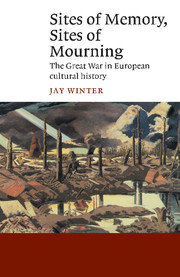Book contents
- Frontmatter
- Contents
- List of illustrations
- Acknowledgements
- List of abbreviations
- Introduction
- I Catastrophe and consolation
- II Cultural codes and languages of mourning
- 5 Mythologies of war: films, popular religion, and the business of the sacred
- 6 The apocalyptic imagination in art: from anticipation to allegory
- 7 The apocalyptic imagination in war literature
- 8 War poetry, romanticism, and the return of the sacred
- 9 Conclusion
- Notes
- Bibliography
- Index
8 - War poetry, romanticism, and the return of the sacred
- Frontmatter
- Contents
- List of illustrations
- Acknowledgements
- List of abbreviations
- Introduction
- I Catastrophe and consolation
- II Cultural codes and languages of mourning
- 5 Mythologies of war: films, popular religion, and the business of the sacred
- 6 The apocalyptic imagination in art: from anticipation to allegory
- 7 The apocalyptic imagination in war literature
- 8 War poetry, romanticism, and the return of the sacred
- 9 Conclusion
- Notes
- Bibliography
- Index
Summary
Both during the war years and afterwards, the dead returned to the living in prose and poetry. In Britain, France, and Germany, many writers used verse to keep the voices of the fallen alive, by speaking for them, to them, about them. Soldiers developed their own form of this genre. Their soliloquies were sad, evocative, often moving, and rarely either simply patriotic or straightforwardly pacifist. Much of this verse was written by men who continued to serve even when they knew the madness of doing so.
In one sense, therefore, war poetry is a set of meditations on the dead and their passing. To privilege this facet of war poetry is to highlight its fusion of the ‘old’ and the ‘new’. Some poems were experimental; others were written in conventional forms. Much of it arose out of the perceived need not to reject out of hand traditional languages about the dead, but rather to reformulate and reinvigorate older tropes about loss of life in wartime.
Much war poetry was reactive. What many soldier-poets could not stomach were the loftier versions of civilian romance about war. Those too old to fight had created an imaginary war, filled with medieval knights, noble warriors, and sacred moments of sacrifice. Such writing in poetry and prose, the ‘high diction’ of the patriots, was worse than banal; it was obscene. In its place, war poets set before our eyes the faces, words, and gestures of once-living men.
- Type
- Chapter
- Information
- Sites of Memory, Sites of MourningThe Great War in European Cultural History, pp. 204 - 222Publisher: Cambridge University PressPrint publication year: 1998

